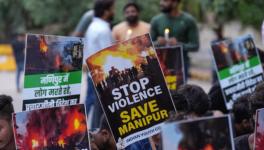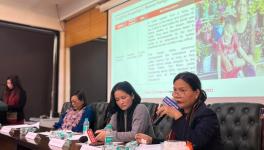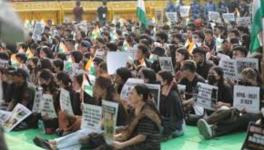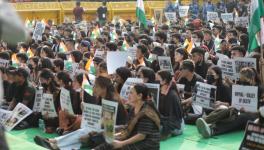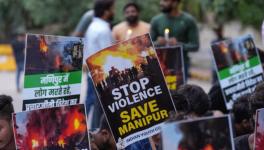Only Dialogue, Trust to Cool Down Manipur Cauldron
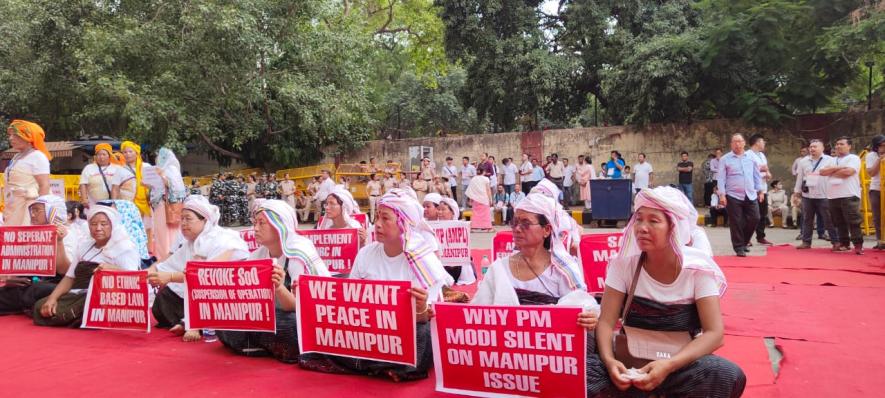
The members of the Joint Coordinating Committee for Peace of Imphal-based Khwairamband Ima Keithel protest at New Delhi’s Jantar Mantar on Monday.
Manipur continues to boil two months after violence engulfed the gorgeous state, famous for its handicrafts, jewels, rich cuisine and exquisite music. More than 150 people have been killed and 60,000 displaced and property worth crores destroyed.
Despite the appeal for peace resonating among residents, the 51-member peace committee formed by the Centre has been denounced by both Kuki and Meitei leaderships. The heavy presence of security forces, including Manipur Commandos and the state police, has failed to curb violence fully.
Reconciliation between Kukis and Meiteis, the two communities at war, is the primary requirement for peace. However, none seem to be putting aside their core demands to initiate reconciliation.
Newsclick spoke to representatives of both Kuki and Meitei leaderships about the urgency of formulating a middle path if peace has to be restored.
FOR MEITEIS, IT IS NARCO-TERRORISM, ILLEGAL IMMIGRATION AND GETTING BACK ANCESTRAL LAND
“As an immediate measure, arms of both communities should be seized to curb violence,” says Coordination Committee on Manipur Integrity (COCOMI) spokesperson Kh Athouba. COCOMI comprises five civil society groups, primarily from the Imphal valley, dominated by the Meiteis.
“Security personnel should be unbiased to restore normalcy and peace. Whereas, the Assam Rifles seemed to be biased towards ‘Kuki narco-terrorists’,” he alleges adding that a sense of normalcy is expected with “schools and markets in the Valley reopening”.
Athouba opposes the strong demand for imposing President’s Rule. “It won’t work in Manipur. President’s Rule was imposed 10 times in the last 60 years; the last was in 2001. New Delhi finds it hard to understand the nuances of local contexts. Measures taken during such conflicts in other parts of India might not be helpful in Manipur—for that matter, the entire Northeast.”
The COCOMI spokesperson is also not unhappy with the state government’s so-called war on narco-terrorism and poppy cultivators and the illegal immigration from Myanmar.
“Do you know the case of Thanglianpau Guite, the head of ZRA (Zomi Revolutionary Army)? He was an MP in Myanmar in the 1990s and has been in Manipur since 1995 having an Indian voter ID card and a passport?” he asks.
The ZRA is a Myanmar-based organisation with a network in Manipur, he adds. “The Union government wrote a letter to the Manipur government about the matter.”
Athouba alleges that “armed Kuki groups are involved in the drug trade and want a separate homeland. A separate administration, as demanded by the Kukis—including the memorandum signed by 10 MLAs—will only lead to unhindered global drug trafficking from Myanmar with Manipur as a corridor”.
Pramot Singh, Thouburel Meitei Lipun (patriarch of Meitei Lipun), says the community is “not bothered much about the situation; it’s part of our struggle to get back our land”.
The state government is “well aware of the history and the situation and tries to do its best. The people elect the government to fulfil their expectations and whether the government can do it by itself or we will have to do it ourselves, only time will determine”, he adds.
Singh claims the British settled some Kukis in Churachandpur and they have swelled as migration from Myanmar continued. “Over time, they have pushed out the original inhabitants from places like Churanchandpur and Kangpokpi. Later, the demand for a separate Kuki homeland grew. In fact, the Kuki population increased after the Kuki-Naga conflicts during the 90s.”
Singh, who sees the violence “as a group trying to snatch our land and we need to protect it for future”, advocates for updating the National Register of Citizens with 1961 as the cut-off year. “Whoever entered the state after that should be identified. The Centre has to take it seriously.”
KUKIS STICK TO THEIR POSITION OF SEPARATE ADMINISTRATION
The Kuki leadership has dug its heels in demanding a separate administration within Manipur.
“Reconciliation between the communities is possible if the government has a political solution, a separate administration for Kuki-dominated areas within Manipur. It is not unconstitutional,” a representative of Kuki Inpi (the community's apex body) says requesting anonymity.
“Meitei brothers drove away all the Kukis in the Valley. Kukis, including government servants, can’t risk their lives returning there. Kuki properties, including houses, were burnt down. There is no trace of us left in the Valley. How can our people go back there for livelihoods? Only a separate administrative provision can safeguard us,” he claims.
The Centre is the only hope of the community, he says. “It is in talks with the SoO (Suspension of Operations) militant groups and some solution may come out. We can’t expect much from the Meitei-dominated state government.”
According to Kuki Inpi, hills are the source of livelihood for the tribals. “The hill lands of Manipur are protected under Article 371C of the Constitution and have been occupied by Kuki Zomi groups, Nagas and Mhars,” he says.
Regarding the state government’s eviction drive on hills, he says, “The survey was arbitrary and hurried. If illegal immigrants are there, why doesn’t the government identify them instead of making all of us bear the brunt?”
The Meiteis, according to him, want the ST status to buy land in the hills. “Moreover, the Meitis think they might get top bureaucratic positions, which Kukis occupy.”
A Core Committee for Separate Administration Movement (CORSAM) representative too stresses the importance of seizing arms to restore peace. “Peace or normalcy is possible only when there are no arms with both sides—but this is not possible overnight,” he said requesting anonymity.
“SoO groups have been demanding autonomy since, at least, 2005 and it was reiterated before May 3, when the violence began. The demand for Kuki-Zomi autonomy within Manipur went on a toss after May 3,” he says adding that Kukis have “realised that it is not going to happen and that even an autonomous council may not be sufficient now”.
Alleging state-sponsored ethnic cleansing, he said, “The Central government appears to be more proactive. The Union home minister stayed in Manipur for three days, which was unprecedented. But at the same time, neither chief minister N Biren Singh has been removed nor President’s Rule imposed. It obviously raises apprehensions.”
IS IT TRIBAL LAND GRAB UNDER THE GUISE OF FOREST PROTECTION?
Protecting hills and reserved forests has been the Singh government’s agenda, which led to the eviction of Kukis from some places in February-March.
But is it merely about protecting land and forests? Rupa Chinai, a veteran journalist with decades-long experience in the Northeast, has some apprehensions.
“It could be ‘land grab’, which can open roads for corporate entities. With the proposed amendments to the Forest (Conservation) Act, (FCA) 1980—Forest (Conservation) Amendment Bill, 2023—the question of land grab from tribals is pertinent. Moreover, coupled with the kinds of projects in the Northeast, like monocrops cultivation replacing traditional ones, naturally triggers apprehension,” Chinai tells Newsclick.
“Under Article 317C of the Constitution, tribal land is protected. How can the government take it away from them? They have turned to drug lords and poppy cultivators. People, especially Kukis, are doing it for genuine reasons,” she contends.
“What measures has the government taken to empower them when the lion’s share of the state Budget is given to the Valley? Drug lords are in every community—even among Meiteis. One cannot target only one community,” she adds.
The proposed amendments provide exemptions from the FCA’s stringent provisions like land within 100 km along the international border is proposed to be used for constructing strategic projects having national importance and security. “The Bill indicates that land can be leased for private set-ups like zoos or eco-tourism,” Chinai alleges.
On the ongoing violence, she says, “What is happening in Manipur is like taking a leaf out of what the Myanmar junta did with the Rohingyas.”
Is there a way to ensure harmony? “I understand that the Meiteis are mainly confined to the Valley, which is smaller compared to the hill areas and is saturating. But there are ways to deal with it like through inter-community dialogue and ensuring communal harmony. Is the BJP government considering Manipur as a test case which it may apply to other tribal areas?” Chinai questions.
IS THERE A MIDDLE WAY OUT?
Is peace possible given the seriousness of the situation? Manipur-based peace activist Deban Mayum feels that the Centre’s “permutations and combinations” based on security measures might only ease the situation momentarily. “The situation might turn more volatile in future.”
The main problem, according to him, is the “deep distrust of Manipuris by successive Central governments based on racial discrimination. If the government is concerned about protecting the international boundary, there should be inter-community dialogue and people taken into trust”.
“International boundary is the main factor in the current mayhem in Manipur. Otherwise, the issue of illegal immigrants and cross-border drug trafficking won’t have surfaced. Dialogue would enable communities to stay together and protect the international border more efficiently. But this dialogue has to be held by trained professionals with ethics. The task cannot be handed only to politicians and bureaucrats,” Deban argues.
Get the latest reports & analysis with people's perspective on Protests, movements & deep analytical videos, discussions of the current affairs in your Telegram app. Subscribe to NewsClick's Telegram channel & get Real-Time updates on stories, as they get published on our website.









